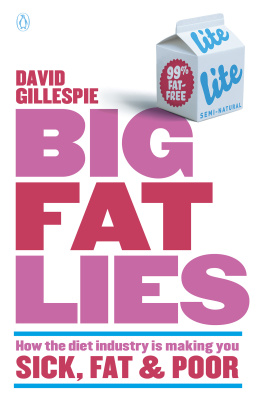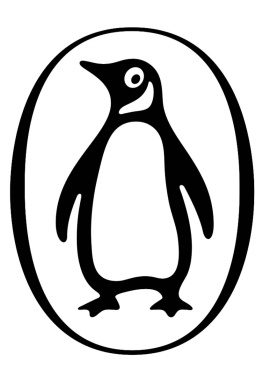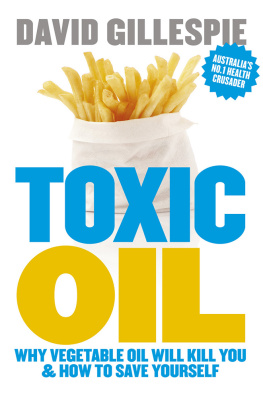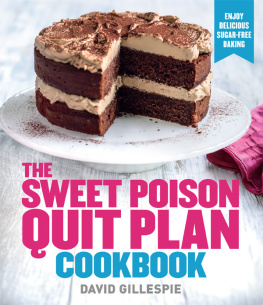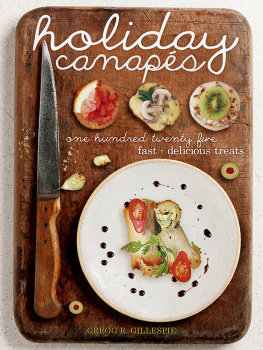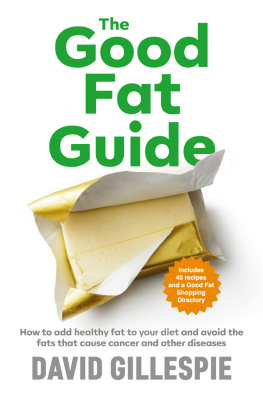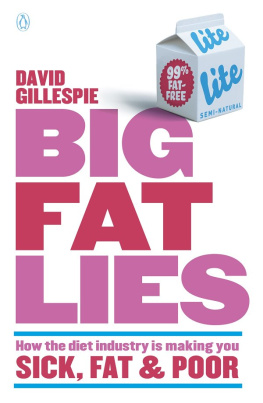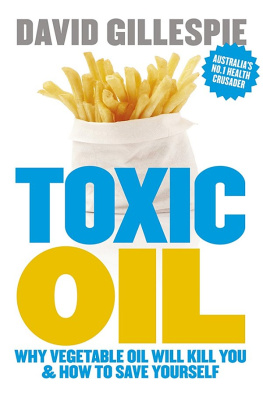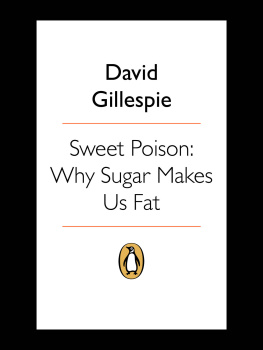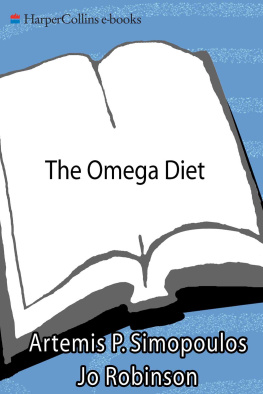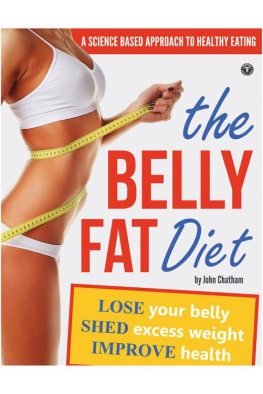PRAISE FOR THE SWEET POISON QUIT PLAN
For a how to book, The Sweet Poison Quit Plan is actually a remarkably interesting read. ANTHEA GLEESON , TOOWOOMBA CHRONICLE
Gillespies book is very readable and his quit plan has simple rules but detailed evidence. HOBART MERCURY
PRAISE FOR SWEET POISON
An eye-opening read on the health implications of too much sugar in our diet. GOOD HEALTH & MEDICINE
Whats impressive about Sweet Poison is that Gillespie turns complex research on what happens to food inside our body and its relation to weight gain into a good read. SYDNEY MORNING HERALD
Comprehensive, thought-provoking and highly readable. THE AGE
David Gillespies groundbreaking book on the dangers of a high sugar intake could well revolutionise the way you diet. A CURRENT AFFAIR
Sweet Poison is a worthy and impassioned effort by an Australian dad to share his surprising discoveries with struggling dieters and provoke further debate about the obesity epidemic. AUSTRALIAN BOOKSELLER & PUBLISHER
Ive lost 11 kg without being on a diet. Its good to know this book is non-fiction. STEVE IRONS MP , MEMBER OF THE PARLIAMENTARY INQUIRY INTO OBESITY
The information contained in this book is not intended as a substitute for consulting with your physician or other health care provider. The publisher and authors are not responsible for any adverse effects or consequences arising from the use of any suggestions, preparations or procedures contained in this book.
All matters relating to your health should be discussed with your doctor.
Introduction
Diets and exercise wont help us lose weight. Vitamins and minerals are a waste of money and sometimes downright dangerous. Sugar makes us fat and sick. And polyunsaturated fat gives us cancer and works with sugar to give us heart disease. The evidence for all of these statements is abundant and unequivocal, but you wont hear anyone in the food and diet industries tell you so. If they did it would have an immediate impact on their sales, and when it comes to a choice between their money and your health, three guesses (oh, okay one, then) which of these wins.
The sad truth is that people like you and me are uniquely vulnerable in a world of chronic disease caused by improvements to our food supply. A choice between corporate profit today and your health in three decades is no choice to a drug or food company or their shareholders. A choice between a government bureaucrat staying on message with what theyve said for the last four decades and your future health is no choice to them if they want to keep their job. A choice between a charity (such as the Australian Heart Foundation) attacking the source of its corporate sponsorship and how well you might be in 2041 is no choice to the people whose jobs depend on that sponsorship.
Even your doctor, the one person paid to have your health uppermost in their mind, is protecting you with both hands tied behind their back. At least one new medical journal article appears every 26 seconds. Just to keep up, your doctor would need to read 3300 journal articles a day (and thats before they started on the backlog). Obviously, even the most studious and dedicated doctor is doing nothing of the sort doctors report spending about four hours a week reading journals, which is still a fair bit of time. This means they rely on the same sources of information (only with more detail) as the rest of us: drug companies, food manufacturers, charities and government employees.
This is a book about truth. Im not a nutritionist or a doctor. I dont have a diet or a magic food to sell you. Im just a lawyer whos worried about my health and the health of my family and who has a lot of time on his hands. This book exists only because I want you to know what the evidence actually says. Lawyers are trained in only one useful thing evidence. This book sets out the evidence about our food. That evidence could not be more clear-cut, and what to do about it could not be more obvious.
Ive chosen to lay out this evidence in a book because books are the only form of mass media available to me that are not influenced by advertising. The companies that benefit from our continued consumption of sugar, polyunsaturated vegetable oils, statin drugs, vitamins and diet plans spend more on advertising (by a country mile) than all other businesses combined. A book it must be theres no other way to communicate in detail the information it contains without the story being influenced by someone whose job depends on advertising.
What can we do?
Apart from this book, you dont need to buy anything. You just need to stop consuming foods containing two substances introduced into our diets in the 1850s sugar and polyunsaturated vegetable oils and avoid the cures introduced after World War II. The inconvenient fact is that this means eliminating almost all processed foods from your diet.
The good news, however, is that saving yourself from the insidious damage being done by sugar and polyunsaturated vegetable oils is as simple as knowing what youre eating. The even better news is that it will cost you nothing. You dont need to pay a diet guru to become thin. You dont need to subsist on a diet of Tibetan cantaloupes infused with dolphin tears. You dont need to pay a muscle-bound fitness fanatic to abuse you in a public park. And you dont need to go to weekly meetings for a dose of group humiliation. By doing nothing apart from avoiding two ingredients, youll lose weight, skip past a list of chronic diseases you couldnt jump over (even if you were being yelled at by a lycra-clad trainer) and save yourself a bucket of money while youre at it.
Our food supply
It might seem like our supermarkets are full of newfangled products that werent there a week ago, let alone last century, but when we brush aside the marketing, very little has changed about our food supply in thousands of years. Were still mammals that require carbohydrates and some fats for fuel. And we still need protein to make our muscles and other bits. They can dress it up in a pretty box and claim its new or better or healthier than it was last week, but our bodies have very simple food requirements. Our metabolism cant read labels and our biochemistry is what it is, no matter what a marketer might tell us.
There have, however, been two very important changes to our food supply in the last hundred years. These changes werent introduced to make us healthier or better people, but for two very simple commercial reasons: increased sales and lower costs. Commercial quantities of sugar were added to food because food with sugar sells better than food without sugar (yes, it really is that simple). And man-made fats were introduced because foods made with polyunsaturated seed oils are cheaper than foods made with animal fats. This means, of course, that there are powerful financial incentives to keep both in the food supply for as long as possible.

